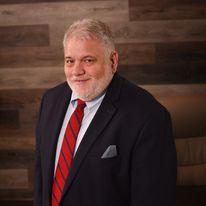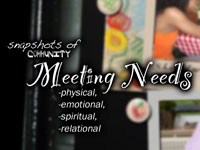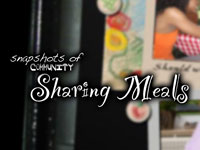



Wes:
The huge redwood trees in California are amazing. They are the largest living things on earth and the tallest trees in the world. Some of them are 300 feet high and more than 2,500 years old. You would think that trees that large would have a tremendous root system, reaching down hundreds of feet into the earth. But that is not the case. Redwoods have a very shallow root system. The roots of these trees are, however, intertwined. They are tied in with each other; interlocked. Thus, when the storms come and the winds blow the redwoods still stand.
With an interlocking root system they support and sustain each other. They need one another to survive. So do we!
Russell Christoff is likely not a familiar name. He is a very unknown actor and model. His only body of work that you might recognize was a small picture found years back on cans of Taster’s Choice instant coffee. He was the guy smelling the aroma. Do you remember that picture?
In 1986, when he took those photos, he was given $250. He was promised that if the photos were used they would pay him $2,500. For 15 years his face sold their product and the odd thing is – he never recognized himself! For 15 years he never realized it was his picture that graced the front of that can. He didn’t drink instant coffee! I guess no one in his family did.
One day, as he walked down the aisle, he looked and there he was! Once he recognized himself he did what any true American would do – he called his lawyer. And in 2002, Tasters Choice settled with him for a sum of $15.6 million dollars.
It pays to recognize yourself! The excitement in living the Christian life comes from realizing our full identity.
William:
My wife, Tasha, and I lived in Dallas, Texas, for awhile, and late one afternoon driving home from work I topped a little hill in the road—now the Dallas Police loved to use this particular hill as a speed trap because you cannot see what’s over it until you actually crest it, but that’s another story—and just as I top the hill I see this guy walking along the side of the road. I glance over as I am driving past and I realize two things: first, it happens to be friend of mine, and secondly, he’s not really walking, maybe a slow shuffle—an upright crawl, really.
Christopher was training to run his first marathon at the time so he would actually run to and from work in downtown Dallas any day he could manage it. Well this summer day in Dallas was only in the 90s but Christopher’s legs and lungs had simply quit on him; still a couple miles from his house. So like any good friend I waved as I drove by—no! I stopped and picked him up, which was a good thing because he was wondering if he would even be able to make it home at that point.
In the course of that and other conversations about running, I picked up on things that runners know, like “shin splints,” how some runners use the bathroom without stopping, and the concept of a runner’s cadence—or rhythm/pace for running. One of the most fascinating things I discovered was that as Christopher trained to run an entire 26.2 mile marathon he never actually ran more than 13 miles as part of his training program. His training was specifically designed to prepare for the White Rock Marathon but his training was actually a very different experience than running the race itself.
We talk all the time about the 3Cs here at Newark Nazarene: Celebration, Community, and Call. In fact, right now we are in the middle of a series about these 3Cs trying to articulate and expand our understanding of who we are as a church body and what God has in store for us. Today as we talk specifically about the second C, Community, we need to think about why these 3Cs—and why Community—is so important to us.
My friend, Christopher, trained to run his marathon, but the two experiences, the training for and the actual running of the race, were quite different from each other. But here in this body we want to understand that the 3Cs are not just some kind of training exercise we do when we get together, but that the 3Cs are actually how we run the whole race—our cadence, our rhythm that we run with every step of every mile in life.
It’s not like we get together to “practice” Celebration, Community, and Call, “in here,” or over at Real Life, or at someone’s house in a small group, and then we have to go back “out there” to a completely different race and change our running style or our cadence. I can’t live one way “in here” and be someone else “over there.” That way of living kills me. I need to be me “everywhere” I am.
Everyday we are living out the 3Cs in some fashion. We decide what is worth doing today (remember the basis of Celebration/worship is “worth”), who are we going to do these worthwhile things with (our Community of people around us) and how will we do them, i.e., how will we contribute (answer a Call) to getting them done. That’s the race we all run everyday.
And we have to recognize that everybody is running. Ever person is daily deciding what is worth doing, who they are going to be with, and how they are going to use their skills and talents. We are all in this marathon of life, together. But it’s how we run the race is what begins to define us from each other.
As Christ-followers we place our relationship with God as the most worthwhile way to live, we then live in such a way that our relationships with others are marked by peace, compassion, and grace, and when we use our talents and abilities we focus not just on what’s in it for us but how we can help and serve those around us (How we can accomplish not just our on will but the most worthwhile Will). There is a definite rhythm or cadence to a Christ-follower’s life; one that does indeed revolve around a distinct rhythm of Celebration, Community and Call.
One question that haunts me continually is how then do we live this way? What is that supposed to look like in my life, as I interact with my family, friends, or co-workers? I mean how do you really live out these ideals we hear and talk about as followers Jesus Christ? Well this is where community becomes vital for us—because as we see those around us really living well, how others’ words, and actions show us how it looks and sounds feels to follow Christ, we get a better picture of how we (personally) can live as a Christ-follower.
So let’s look at some snapshots in the scriptures and pick up the cadence, the rhythm, of Community in Jesus’ life. Because as followers of Jesus Christ, we believe that the way he lived—the cadence of Jesus—is the best way we can live; the way we were created to live.  Teaching/Meaningful Conversations Snapshots:
Teaching/Meaningful Conversations Snapshots:
“Now when he saw the crowds, he went up on a mountainside and sat down. His disciples came to him, and he began to teach them, saying: ‘Blessed are the poor in spirit, for theirs is the kingdom of heaven’ . . . (Matthew 5:1-3)
“Again Jesus called the crowd to him and said, "Listen to me, everyone, and understand this . . .” (Mark 7:14)
Other examples: at the temple feasts, while stopped on the side of the road, when asked a question in private, when he got a funny look over the dinner table, even when people were “baiting” Him to stumble over His words . . .
Jesus’ teaching revolved around who God is and who people are in relation to God, and how this relationship is central to how we see ourselves and run our race, but just as often as we se Jesus in the public eye, teaching a large crowd, we also see Jesus connecting with people individually, in small group settings, over meals, in people’s houses. The Biblical stories of Jesus’ teaching revolve around meaningful conversations, speaking truth into people’s lives, supporting those who are hurting, using His words (language) to help people understand the way they were created to live and love and work and play. Jesus teaching wasn’t always about the crowd but really about individual lives he saw around him and how they understood and related to God and each other.  Meeting needs Snapshots (physical, emotional, spiritual, relational):
Meeting needs Snapshots (physical, emotional, spiritual, relational):
“And a woman was there who had been subject to bleeding for twelve years. . . . When she heard about Jesus, she came up behind him in the crowd and touched his cloak, because she thought, ‘If I just touch his clothes, I will be healed.’ Immediately her bleeding stopped and she felt in her body that she was freed from her suffering. . . . He said to her, ‘Daughter . . . Go in peace and be freed from your suffering.’” (Mark 5:25-34)
“A man with leprosy came to him and begged him on his knees, ‘If you are willing, you can make me clean.’ Filled with compassion, Jesus reached out his hand and touched the man. ‘I am willing,’ he said. ‘Be clean!’” (Mark 1:40-41)
Other examples: group of men with leprosy, blind man/men, lame to walk, sick made well, dead were raised . . .
What is Jesus doing as he met these individuals needs? There is no definite pattern or template to answer that question. Sometime he touched people; sometime he simply spoke. Sometimes he used the needs to illustrate a point; sometimes it seems he simply met people’s needs out of love and respect. In some instances he sought out the people who needed healing; at other times they interrupted Him as he was doing something else. At times a link with a person’s faith is made to their needs, but other times it faith is not even considered—or even lacking. One thing we can take away from these pictures of Jesus life and work is that He met the needs of those around Him. Many times while healing we can see that it is not just the obvious need Jesus is concerned with but something much bigger. Having helped them, he tells one person to go and sin no more, another he says they shouldn’t follow him but to go home to their family and tell them about what God has done for them, another he sends to the temple to sacrifice and tell the priests, still some he tells them their sins are forgive, and even more he simply asks they not spread it around what he did for them.
We see not just physical needs met but also emotional, spiritual, relational . . . what would it really be like to not be touched for years and then be made whole (emotionally, spiritually, relationally) and sent home to your family after being alone so long. How did it for someone who had always been on the “outside” to finally walk into the presence of God and worship for the first time in their life?! What about the one whom no on knew their pain or about the alienation they felt daily finding out they had people who loved them, a place where they belonged. Not just physically built through words and companionship, Jesus met the needs of people around them as they arose. And not just because people happened to be “at the right place at the right time” but because Jesus never lost sight of how much people are worth; He never lot sight of God’s wishes and dreams for people. Jesus intentionally worked at helping people live the best life possible; to live well. He helped people be “whole” again.  Sharing meals Snapshots:
Sharing meals Snapshots:
“Now one of the Pharisees invited Jesus to have dinner with him, so he went to the Pharisee's house and reclined at the table.” (Luke 7:36)
“By this time it was late in the day, so his disciples came to him. ‘This is a remote place,’ they said, ‘and it's already very late. Send the people away so they can go to the surrounding countryside and villages and buy themselves something to eat.’ But he answered, ‘You give them something to eat.’” (Mark 6:35-37a)
“When they landed, they saw a fire of burning coals there with fish on it, and some bread. Jesus said to them, "Bring some of the fish you have just caught." Simon Peter climbed aboard and dragged the net ashore. It was full of large fish, 153, but even with so many the net was not torn. Jesus said to them, "Come and have breakfast." . . . Jesus came, took the bread and gave it to them, and did the same with the fish. This was now the third time Jesus appeared to his disciples after he was raised from the dead.
When they had finished eating, Jesus said to Simon Peter . . . (John 21:9-13a)
Other examples: Jewish feasts and holidays, Last Supper, plucking heads of grain on the way to synagogue, wedding feast, meals at a friend’s (Lazarus) house . . .
Sharing meals may not sound like it should be a main point as we look over the snapshots of Jesus time in the Biblical story but as we look at His story I think we can quickly see that the teaching and healing and words and works of Jesus quite often revolved around the presence of or an illustration involving food—or lack thereof. Many of the “teachable moments” we find Jesus having purposeful and meaningful conversations are at the holiday feasts, over a dinner, “breaking bread” with his disciples.
Food seems to be a unifier in the Biblical story (from Adam and Eve to the Wedding Feast Christ promises), a common theme in the celebration and worship of a relationship with God, a place we often find Jesus speaking or healing around. The meals we share are significant.  Inviting others along Snapshots:
Inviting others along Snapshots:
As Jesus walked beside the Sea of Galilee, he saw Simon and his brother Andrew casting a net into the lake, for they were fishermen. "Come, follow me," Jesus said, "and I will make you fishers of men." At once they left their nets and followed him. When he had gone a little farther, he saw James son of Zebedee and his brother John in a boat, preparing their nets. Without delay he called them, and they left their father Zebedee in the boat with the hired men and followed him. (Mark 1:16-20)
He said to another man, "Follow me." But the man replied, "Lord, first let me go and bury my father." Jesus said to him, "Let the dead bury their own dead, but you go and proclaim the kingdom of God.’” (Luke 9:59-60)
“Then Jesus came to them and said, ‘All authority in heaven and on earth has been given to me. Therefore go and make disciples of all nations, baptizing them in the name of the Father and of the Son and of the Holy Spirit, and teaching them to obey everything I have commanded you. And surely I am with you always, to the very end of the age.’” (Matthew 28:19-20)
other examples . . . “I will follow you . . . , ” some of John the Baptist’s disciples move to Jesus, Gerasenes Demoniac--“Legion”/other instances where he sent them home to tell offer sacrifices, tell others, Saul’s conversion experience
If you take the first three sets of pictures of Jesus life and ministry and look at the faces around Him in them you will see that all along the way, Jesus was constantly pulling others into the picture—sharing the limelight, really. Never forcefully, just inviting others “in” to share their time and skills and love. Not every agreed to get in the picture but that didn’t really matter because those who were and those who were going to jump in were always worth the asking. And what were they really being asked to do? Share in meaningful conversation, use the skills and talents for others benefit, (or as with one boy) share their lunch, maybe.
Jesus simply ran a certain cadence, a certain rhythm, with His words and His actions and His stuff, and invited others to run alongside Him. And this small group of runners Christ started with focused their race more and more on God as they discovered how much He loved them and really was involved in their lives. They kept the pace even after Jesus was no longer running physically with them. And the people that joined in with the cadence Christ set invited other in. who invited others in, who invited others in, and so on. And that same cadence, that same rhythm of running can still be found today. We are continuing the race Jesus began in this world.
If you are running with this rhythm it’s only because someone at one time or another was already running it and told you about or showed you this Jesus and you joined in with the pack. And someone had told them, and someone had showed them. From this one small group in the pictures of Jesus’ community came a group of people who have changed the way we see God and love others.
Snapshots of Community:
The community Jesus surrounded Himself with and that has led to us began as a small group of men and women who were called Christ’s disciples. The things they did, meaningful conversations, meeting others needs, sharing their time and food, and always being open to new friends and faces, looks and sounds a lot like what we mean when we talk about small groups, today. Small groups are not new, finding a place where we really feel as though we belong isn’t novel, and community is not a fad; no, true community, community that transforms our lives and even the world, is simply how a Christ-follower is to run the race of life.
So this may mean a couple of things to us today. If you are a member or a leader or a host, or you bring the soda to a small group, realize that the potential relationships and service and worthwhile thing you do are the stuff of eternal significance to God!
And if you have not found a place where you feel as though you belong in this local body of Christ let me just let you know that there are several ways to plug in to the small groups we have here:
If you would like to get plugged in phone or email me, use your connection card, today only: sign-up at the information desk in the upper foyer, log onto our website . . .
You see it is through small group Community that we find the rhythm of the 3Cs come together in a gathering of people committed to and encouraging one another in spiritual transformation. And every single Christ-follower should be a part of some form of transforming community.
Wes:
Larry Crabb, a Christian psychologist wrote: “A central task of community is to create a place that is safe enough for the walls to be torn down, safe enough for each of us to reveal our brokenness.” The song from the TV show “Cheers” talks about the bar being a place “where everybody knows your name.” The idea is that it is a place where people care about you. In an article entitled “Lessons from A Tavern,” Chuck Swindoll writes: “An old Marine Corps buddy of mine, to my pleasant surprise, came to know Christ after he was discharged. I say surprise because he cursed loudly, fought hard, chased women, drank heavily, loved war and weapons, and hated chapel services. A number of months ago, I ran into this fellow, and after we’d talked awhile, he put his hand on my shoulder and said, ‘You know, Chuck, the only thing I still miss is that old fellowship I used to have with all the guys down at the tavern. I remember how we used to sit around and let our hair down. I can’t find anything like that for Christians. I no longer have a place to admit my faults and talk about my battles — where somebody won’t preach at me and frown and quote me a verse.’ It wasn’t one month later that in my reading I came across this profound paragraph: ‘The neighborhood bar is possibly the best counterfeit that there is to the fellowship Christ wants to give his church. It’s an imitation, dispensing liquor instead of grace, escape rather than reality — but it is a permissive, accepting, and inclusive fellowship. It is unshockable. You can tell people secrets, and they usually don’t tell others or even want to. The bar flourishes not because most people are alcoholics, but because God has put into the human heart the desire to know and be known, to love and be loved, and so many seek a counterfeit at the price of a few beers. With all my heart,’ this writer concludes, ‘I believe that Christ wants his church to be unshockable, a fellowship where people can come in and say, “I’m sunk, I’m beat, I’ve had it.” Alcoholics Anonymous has this quality — our churches too often miss it.’”
Sometimes you want to go
Where everybody knows your name,
And they're always glad you came;
You want to be where you can see,
Our troubles are all the same;
You want to be where everybody knows your name.
Lone Ranger: There are no lone rangers in the body of Christ.